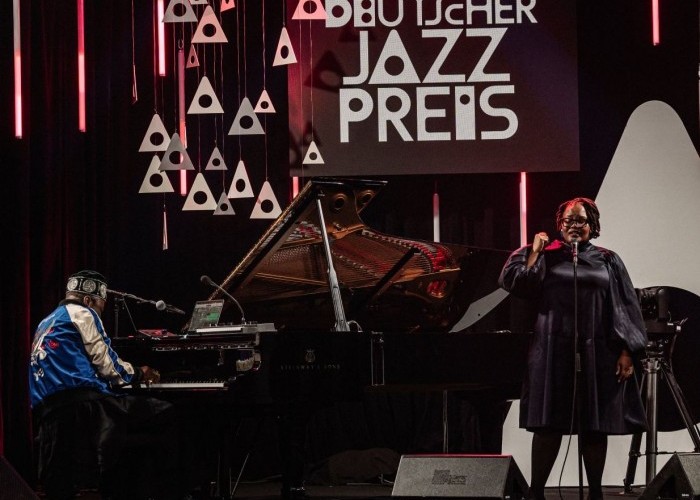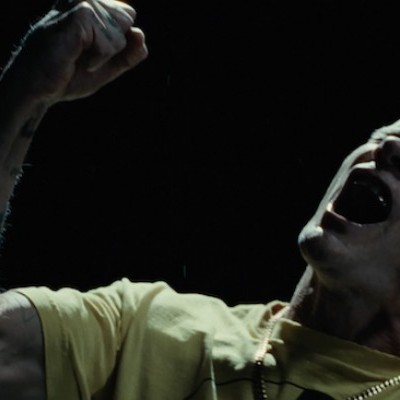Dec 9, 2025 12:28 PM
In Memoriam: Gordon Goodwin, 1954–2025
Gordon Goodwin, an award-winning saxophonist, pianist, bandleader, composer and arranger, died Dec. 8 in Los Angeles.…

Pianist Nduduzo Makathini, who received the award for International Live Act of the Year, performs with singer Omagugi Makathini at this year’s Deutscher Jazzpreis.
(Photo: Robert Winter)Germany is a nation steeped in music. And the Deutscher Jazzpreis (German Jazz Prize), an important and well-attended annual gathering in the country’s jazz calendar, serves as a good reminder of that.
Recent official statistics show that the number of Germans involved in active music-making has risen to a whopping 16.5 million, or 22 percent of the population over the age of 6. Support for jazz feels real, too, and starts from the top: The country has a Head of State, Frank-Walter Steinmeier, who happens to be a huge jazz fan. He regularly turns Schloss Bellevue, the official presidential residence in Berlin, into a venue for a concert and a hang where the jazz community can be at home, and he never misses the opportunity in his speeches to remind the population that jazz and improvised music have in Germany’s past — and still can, as he said recently — “give people hope for a different, free and self-determined life.”
The German Jazz Prize — this year’s ceremony was in Cologne and it will move to Bremen for the next two years — is a visible manifestation of that support. The awards, 22 categories of them, are funded by the Culture Ministry and produced by the publicly funded agency Initiative Musik. The winners of the prize categories (groups or individuals) don’t just receive a triangular silver trophy. More significantly, they are given prize money which has risen this year to 12,000 euros per category, and each and every one of the non-winning nominees receives 4,000 euros. The total prize pot is around 500,000 euros. (For a complete list of this year’s award winners, see below.)
The awards started in 2021, replacing the Echo Jazz awards (2010–’17) which had been run by the record industry. That dominance had given rise to a reproach of narrowness: the industry was seen as failing to do justice to the breadth and depth of the scene — by musicians, by the 18 conservatoires offering full-time jazz courses and by the powerful ranks of national and regional broadcasters. So in stepped the government. Germany’s federal system of government is complex — humorists have called it a watch with 17 gear-wheels, some of them turning backwards — and the organizers of the awards instinctively apply a complex set of checks and balances to ensure that its different agendas are defended. This year’s awards received 1,200 submissions. Hannes Möller, the project leader of the awards, said, with skillful diplomacy: “The criticisms we receive are helpful and we welcome them. We try to improve the awards.”
The event this year lasted three hours with no interval. The German way of giving out awards means that a citation or “Laudatio” is read out for every category, that every winner gets to make a short acceptance speech.
And yet there was a really powerful, truly musical moment at about the two-and-a-half-hour mark. Whereas industry gatherings can make live music into a distraction from all the networking and instagramming, that generalization doesn’t take account of how a musician like Nduduzo Makathini can affect a German audience. He was performing in a duo with singer Omagugi Makathini, and the palpable quality of the spellbound silence into which they were able to transport the entire audience was remarkable. His award of International Live Act of the Year was utterly justified by the transfixed eyes and ears of the whole gathering. As one Belgian promoter remarked, “It was a very beautiful moment.”
Among other highly deserving recipients, Jihye Lee, winner of the award for Large Ensemble of the Year International, was praised for the “meticulous precision, boundless creativity and emotional depth” of her music. The citation for saxophonist Ingrid Laubrock, winner of Artist of the Year–Woodwind, noted the sheer range of her creativity and her unique improvisational voice, and her acceptance speech had the memorable line, “this is a grassroots thing we do.”
One of the night’s big prizes, Artist of the Year, went to drummer Eva Klesse, an immensely popular figure, and “an artist whose creative force radiates far beyond the instrument.” Artist of the Year in Piano/Keyboard Kit Downes, now resident in Berlin, was praised for music that is “adventurous, technically brilliant and always full of personality,” and for making his mark on the scene worldwide. Away from jazz and into the domain of R&B/soul, the Vocalist of the Year was Sera Kalo, raised in Connecticut, of St. Lucian/Dominican heritage, and now based in Berlin. She gave a passionate speech focused on “the right to exist without fear.”
“Governments don’t swing” was the mantra of Mike Zwerin’s 1983 book Close Enough for Jazz. As a major, government-sponsored exercise to draw attention to jazz, the German Jazz Prize certainly puts that remark into question. The simplest and best response I’ve heard was a grateful reflection from a nominee. As she said to me: “What an amazing thing, to put all that money into the artists.” DB
ARTISTS
Vocal: Sera Kalo
Woodwinds: Ingrid Laubrock
Brass Instruments: Dima Bondarev
Piano/Keyboard Instruments: Kit Downes
String Instruments: Nick Dunston
Drums/Percussion: Philo Tsoungui
Artist of the Year: Eva Klesse
Large Ensemble of the Year: Carl Wittigs Aurora Oktett
Artist of the Year International: Marshall Allen
Large Ensemble of the Year International: Jihye Lee Orchestra
RECORDING/PRODUCTION
Album of the Year: Love Avatar, Peter Gall
Newcomer of the Year: Do You Remember?, Sonic Interventions
Broadcast Production of the Year: Allgäu Meets India, hr-Bigband featuring Matthias Schriefl
Album of the Year International: ØKSE, ØKSE
Newcomer of the Year International: Good Intentions, Alden Hellmuth
LIVE
Festival of the Year: PENG Festival
Live Act of the Year: Andromeda Mega Express Orchestra
Live Act of the Year International: Nduduzo Makhathini
COMPOSITION/ARRANGEMENT
Composition/Arrangement of the Year: “PlanetWoman,” Birgitta Flick
SPECIAL PRIZES
Journalistic Achievement: JazzFacts Deutschlandreise, “Deutschlandfunk”
Lifetime Achievement: Uschi Brüning
Music Mediation: Jazzpilot:innen

Goodwin was one of the most acclaimed, successful and influential jazz musicians of his generation.
Dec 9, 2025 12:28 PM
Gordon Goodwin, an award-winning saxophonist, pianist, bandleader, composer and arranger, died Dec. 8 in Los Angeles.…

Belá Fleck during an interview with Fredrika Whitfield on CNN.
Jan 13, 2026 2:09 PM
The fallout from the renaming of the John F. Kennedy Center for the Performing Arts to include President Donald…

The success of Oregon’s first album, 1971’s Music Of Another Present Era, allowed Towner to establish a solo career.
Jan 19, 2026 5:02 PM
Ralph Towner, a guitarist and composer who blended multiple genres, including jazz — and throughout them all remained…

Flea has returned to his first instrument — the trumpet — and assembled a dream band of jazz musicians to record a new album.
Dec 2, 2025 2:01 AM
After a nearly five-decade career as one of his generation’s defining rock bassists, Flea has returned to his first…

Rico’s Anti-Microbial Instrument Swab
Jan 19, 2026 2:48 PM
With this year’s NAMM Show right around the corner, we can look forward to plenty of new and innovative instruments…